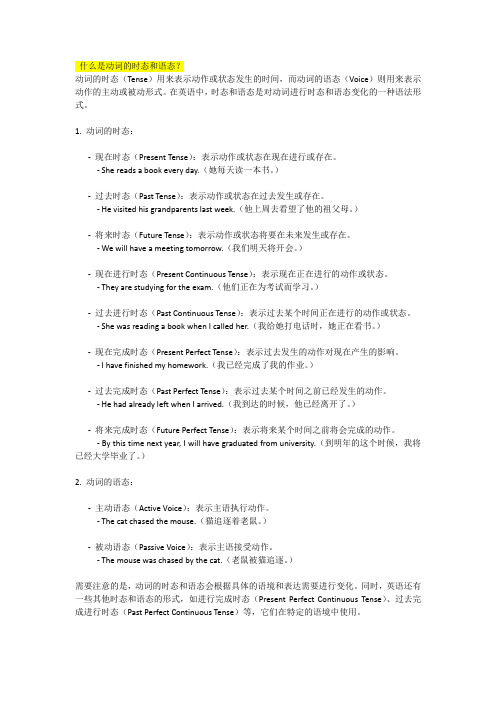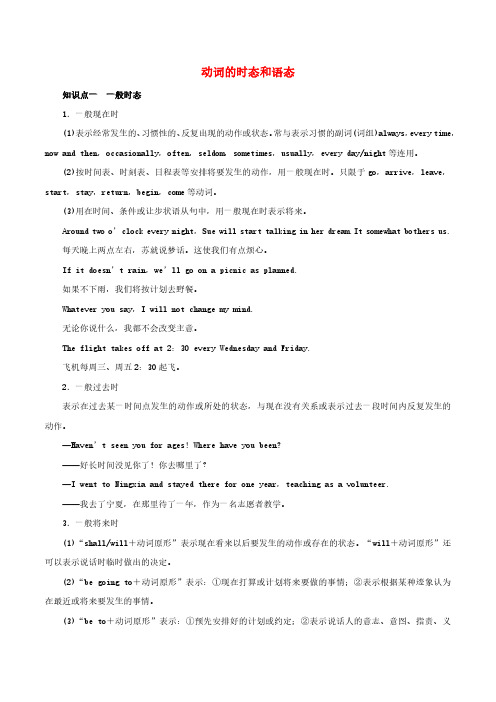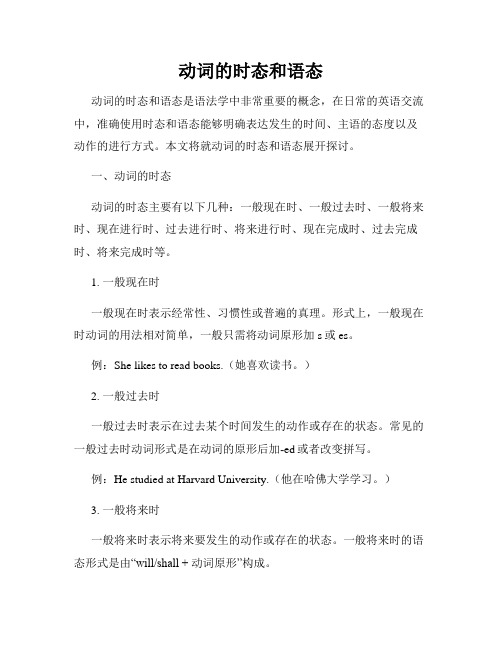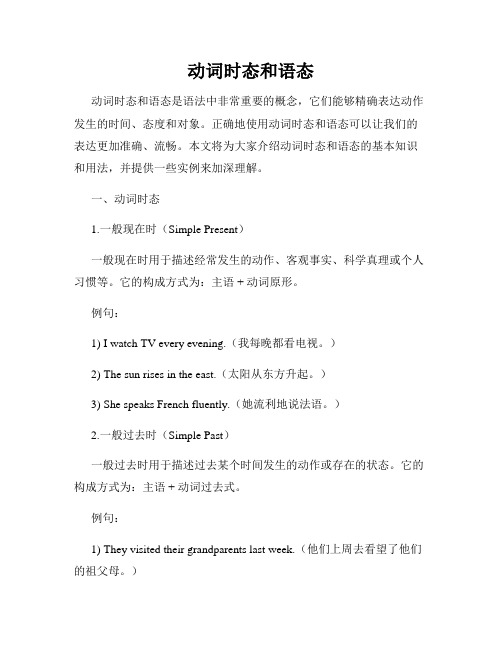动词时态和语态
什么是动词的时态和语态

什么是动词的时态和语态?动词的时态(Tense)用来表示动作或状态发生的时间,而动词的语态(Voice)则用来表示动作的主动或被动形式。
在英语中,时态和语态是对动词进行时态和语态变化的一种语法形式。
1. 动词的时态:-现在时态(Present Tense):表示动作或状态在现在进行或存在。
- She reads a book every day.(她每天读一本书。
)-过去时态(Past Tense):表示动作或状态在过去发生或存在。
- He visited his grandparents last week.(他上周去看望了他的祖父母。
)-将来时态(Future Tense):表示动作或状态将要在未来发生或存在。
- We will have a meeting tomorrow.(我们明天将开会。
)-现在进行时态(Present Continuous Tense):表示现在正在进行的动作或状态。
- They are studying for the exam.(他们正在为考试而学习。
)-过去进行时态(Past Continuous Tense):表示过去某个时间正在进行的动作或状态。
- She was reading a book when I called her.(我给她打电话时,她正在看书。
)-现在完成时态(Present Perfect Tense):表示过去发生的动作对现在产生的影响。
- I have finished my homework.(我已经完成了我的作业。
)-过去完成时态(Past Perfect Tense):表示过去某个时间之前已经发生的动作。
- He had already left when I arrived.(我到达的时候,他已经离开了。
)-将来完成时态(Future Perfect Tense):表示将来某个时间之前将会完成的动作。
- By this time next year, I will have graduated from university.(到明年的这个时候,我将已经大学毕业了。
动词时态与语态总结

动词时态与语态总结动词时态和语态是英语语法中的重要概念,准确运用时态和语态可以使语言更加准确、流畅。
本文将对动词时态和语态进行总结和归纳,帮助读者更好地掌握这方面的知识。
一、动词时态1. 一般现在时(Simple Present Tense)一般现在时表示经常性、习惯性或普遍真理的动作或状态。
句子结构为主语+动词原形。
Example: She dances every evening.(她每天晚上跳舞。
)2. 一般过去时(Simple Past Tense)一般过去时表示过去发生的动作或状态。
句子结构为主语+动词过去式。
Example: They went to the park yesterday.(昨天他们去了公园。
)3. 一般将来时(Simple Future Tense)一般将来时表示将来发生的动作或状态。
句子结构为主语+will/shall+动词原形。
Example: I will travel to London next week.(我下周将去伦敦。
)4. 现在进行时(Present Continuous Tense)现在进行时表示现在正在进行的动作。
句子结构为主语+be动词+动词-ing形式。
Example: She is studying at the library.(她正在图书馆学习。
)5. 过去进行时(Past Continuous Tense)过去进行时表示过去某个时间正在进行的动作。
句子结构为主语+was/were+动词-ing形式。
Example: They were having dinner when the phone rang.(电话响时,他们正在吃晚饭。
)6. 将来进行时(Future Continuous Tense)将来进行时表示将来某个时间正在进行的动作。
句子结构为主语+will/shall+be+动词-ing形式。
Example: We will be waiting for you at the airport tomorrow.(明天我们将在机场等你。
英语动词时态和语态

动词的时态和语态知识点一一般时态1.一般现在时(1)表示经常发生的、习惯性的、反复出现的动作或状态。
常与表示习惯的副词(词组)always,every time,now and then,occasionally,often,seldom,sometimes,usually,every day/night等连用。
(2)按时间表、时刻表、日程表等安排将要发生的动作,用一般现在时。
只限于go,arrive,leave,start,stay,return,begin,come等动词。
(3)用在时间、条件或让步状语从句中,用一般现在时表示将来。
Around two o’clock every night,Sue will start talking in her dream.It somewhat bothers us.每天晚上两点左右,苏就说梦话。
这使我们有点烦心。
If it doesn’t rain,we’ll go on a picnic as planned.如果不下雨,我们将按计划去野餐。
Whatever you say,I will not change my mind.无论你说什么,我都不会改变主意。
The flight takes off at2:30every Wednesday and Friday.飞机每周三、周五2:30起飞。
2.一般过去时表示在过去某一时间点发生的动作或所处的状态,与现在没有关系或表示过去一段时间内反复发生的动作。
—Haven’t seen you for ages!Where have you been?——好长时间没见你了!你去哪里了?—I went to Ningxia and stayed there for one year,teaching as a volunteer.——我去了宁夏,在那里待了一年,作为一名志愿者教学。
3.一般将来时(1)“shall/will+动词原形”表示现在看来以后要发生的动作或存在的状态。
动词的时态和语态

动词的时态和语态动词的时态和语态是语法学中非常重要的概念,在日常的英语交流中,准确使用时态和语态能够明确表达发生的时间、主语的态度以及动作的进行方式。
本文将就动词的时态和语态展开探讨。
一、动词的时态动词的时态主要有以下几种:一般现在时、一般过去时、一般将来时、现在进行时、过去进行时、将来进行时、现在完成时、过去完成时、将来完成时等。
1. 一般现在时一般现在时表示经常性、习惯性或普遍的真理。
形式上,一般现在时动词的用法相对简单,一般只需将动词原形加s或es。
例:She likes to read books.(她喜欢读书。
)2. 一般过去时一般过去时表示在过去某个时间发生的动作或存在的状态。
常见的一般过去时动词形式是在动词的原形后加-ed或者改变拼写。
例:He studied at Harvard University.(他在哈佛大学学习。
)3. 一般将来时一般将来时表示将来要发生的动作或存在的状态。
一般将来时的语态形式是由“will/shall + 动词原形”构成。
例:I will go to the park tomorrow.(明天我将去公园。
)4. 现在进行时现在进行时表示正在进行的动作。
现在进行时的时态形式是由“be 动词(am/is/are)+动词-ing形式”构成。
例:They are playing basketball now.(他们现在正在打篮球。
)5. 过去进行时过去进行时表示过去某个时间正在进行的动作。
过去进行时的时态形式是由“was/were + 动词-ing形式”构成。
例:He was studying at the library yesterday.(昨天他在图书馆学习。
)6. 将来进行时将来进行时表示将来某个时间正在进行的动作。
将来进行时的时态形式是由“will be + 动词-ing形式”构成。
例:They will be traveling to Europe next month.(他们下个月将要去欧洲旅行。
动词的时态与语态变化

动词的时态与语态变化动词是语言中的重要组成部分,通过时态与语态的变化,我们可以清晰地表达出事件发生的时间和态度。
时态指的是动作或状态发生的时间,分为过去、现在和将来三个时态。
而语态则表示动作的主体与客体之间的关系,主要分为主动语态和被动语态。
在语言表达中,正确运用动词的时态和语态变化是非常重要的,下面将从几个方面详细介绍动词的时态与语态变化。
一、动词的时态变化1. 过去时态(Past Tense)过去时态用于表示已经发生或已经完成的动作或状态。
动词的过去时态一般由动词原形后加上-ed结尾来构成,例如:- I walked to school yesterday.(昨天我走路去学校。
)- She cooked dinner for her family last night.(她昨晚为家人做饭。
)2. 现在时态(Present Tense)现在时态用于表示正在发生或经常性发生的动作或状态。
动词的现在时态一般由动词原形来表示,例如:- They play tennis every Sunday.(他们每个星期天打网球。
)- The sun rises in the east.(太阳从东方升起。
)3. 将来时态(Future Tense)将来时态用于表示将要发生的动作或状态。
动词的将来时态一般由助动词will或shall加上动词原形构成,例如:- We will go on a trip next week.(下周我们将去旅行。
)- She shall study hard for the exam.(她将为考试努力学习。
)二、动词的语态变化1. 主动语态(Active Voice)主动语态表示主语是动作的执行者或实施者。
在主动语态中,主语在句子中承担着主要的语法成分,动词根据主语的人称和数的变化而变化。
例如:- They built a new house.(他们建了一座新房子。
)- She writes articles for a magazine.(她为一家杂志写文章。
动词时态和语态

动词时态和语态动词时态和语态是语法中非常重要的概念,它们能够精确表达动作发生的时间、态度和对象。
正确地使用动词时态和语态可以让我们的表达更加准确、流畅。
本文将为大家介绍动词时态和语态的基本知识和用法,并提供一些实例来加深理解。
一、动词时态1.一般现在时(Simple Present)一般现在时用于描述经常发生的动作、客观事实、科学真理或个人习惯等。
它的构成方式为:主语 + 动词原形。
例句:1) I watch TV every evening.(我每晚都看电视。
)2) The sun rises in the east.(太阳从东方升起。
)3) She speaks French fluently.(她流利地说法语。
)2.一般过去时(Simple Past)一般过去时用于描述过去某个时间发生的动作或存在的状态。
它的构成方式为:主语 + 动词过去式。
例句:1) They visited their grandparents last week.(他们上周去看望了他们的祖父母。
)2) I lived in London for five years.(我在伦敦生活了五年。
)3) He didn't finish his homework yesterday.(他昨天没完成作业。
)3.一般将来时(Simple Future)一般将来时用于描述将要发生的动作或存在的状态。
它的构成方式为:主语 + will + 动词原形。
例句:1) I will call you later.(我过会儿会给你打电话。
)2) They will travel to Japan next month.(他们下个月会去日本旅行。
)3) She won't be here tomorrow.(她明天不会在这里。
)4.现在进行时(Present Continuous)现在进行时用于描述当前正在进行的动作。
它的构成方式为:主语+ am/is/are + 动词-ing。
动词的时态和语态

【翻译句子】 (7) He told me he read an interesting novel last night. 他告诉我他昨晚看了一本有趣的小说。 【结论2】如果从句中有一个过去的时间状语,尽 管从句中的动作先于主句发生,但从句中的谓语动 词仍用过去式。 【结论3】表示两个紧接着发生的动作,常由以下 词语连接,用一般过去时。常见连词有:but, and, when, as soon as, immediately, the moment, the minute。 如 : He rushed into the room and sat down immediately.
【疑难2】 We had no sooner been seated than the bus started. = No sooner had we been seated than the bus started. 【疑难剖析2】hardly / scarcely…when (before);no sooner…than表示“一……就……”。
3. 一般将来时 【翻译句子】 (8)我们下周将会讨论这个话题。 We will talk about this topic next week. 【结论1】表示未来的动作或状态常用will / shall + 动词(常与表示将来的时间状语连用,如tomorrow, next week等)。
【翻译句子】 (9) The bus is coming. 公共汽车就要到了。 【结论2】表示一种趋向或习惯动作。表示趋向行 为的动词,如come,go,start,begin,leave等词, 常用进行时的形式表示将来时。
【疑难2】The room remains clean. You are allowed to speak here. 【疑难剖析2】下面四类动词不宜用现在进行时: a. 表示心理状态、情感的动词:like, love, hate, care, remember, believe, want, mind, wish, agree, mean, need。 b. 表存在的状态的动词:appear, exist, lie, remain, seem, belong to, depend on。 c. 表示瞬间动作的动词:allow, accept, permit, promise, admit, complete。 d. 表示感官的动词:see, hear, notice, feel, smell, sound, taste, look。
16种动词的时态和语态

【主动语态】一般现在时:do一般过去时:did一般将来时:willdo现在进行时:be doing(be随人称变化)过去进行时:was/weredoing现在完成时:have/has done过去完成时:had done过去将来时:woulddo将来完成时:will have done将来进行时:will be doing将来完成进行时:will have been doing现在完成进行时:have been doing过去将来完成时:would have done过去完成进行时:had been doing过去将来进行时:would be doing过去将来完成进行时:would have been doing【被动语态】一般现在时:be done(be随人称变化)一般过去时:was/were done一般将来时:will be done现在进行时:be being done(前面的be随人称变化,后面的being固定)过去进行时:was/were being done(being固定)现在完成时:have/has been done过去完成时:had been done过去将来时:would be done将来完成时:will have been done将来进行时:will be being done(being固定)将来完成进行时:will have been being done现在完成进行时:have been being done过去将来完成时:would have been done过去完成进行时:had been being done过去将来进行时:would be being done过去将来完成进行时:would have been being done。
- 1、下载文档前请自行甄别文档内容的完整性,平台不提供额外的编辑、内容补充、找答案等附加服务。
- 2、"仅部分预览"的文档,不可在线预览部分如存在完整性等问题,可反馈申请退款(可完整预览的文档不适用该条件!)。
- 3、如文档侵犯您的权益,请联系客服反馈,我们会尽快为您处理(人工客服工作时间:9:00-18:30)。
动词时态和语态(2)一、时态的呼应:在复合句,从句(主要是宾语从句)中的时态,常受主句谓语动词的影响,这就叫做时态的呼应,时态的呼应一般有如下的情况。
1、如果主句的谓语动词为现在时态,其从句中的谓语动词应该用什么时态就用什么时态,如:She knows you have been in Beijing for five rears.2、如果主句中的谓语动词为过去时态,从句中的谓语动词就要用过去时态,但要注意到下列情况:(1)如果从句中的谓语动词所表示的动作与主句中的谓语动词所表示的动作同时发生,从句中须用一般过去时或过去进行时,如:She said she was busy then. (2)如果从句中的谓语动词所表示的动作发生在主句谓语动词所表示的动作之前,从句中须用过去完成时,如:I didn’t know that she had been to London twice. (3)如果从句中的谓语动词所表示的动作发生在主句谓语动词所表示的动作之后,从句须用过去将来时,如:They didn’t know when they would have a rest. (4)如果从句中说明的是一种普遍真理现象,虽然主句的谓语动词为过去时态从句中仍要用一般现在时,如:When I was a little child, my father told me that the earth is round. (5)如果从句中有表示具体过去时间的状语,虽然其谓语动词所表示的动作发生在主句谓语动词所表示的动作之前,从句仍用一般过去时,但如果该状语表示的时间不具体,则从句仍要用过去完成时,如:Tome said he was born in 1975.二、被动语态:英语动词的语态有两种:主动语态和被动语态。
主动语态表示主语是动作的执行者,被动语态表示主语是动作的承受者,在被动语态的句子中,动作的执行者,一般由介词by引起的短语来表示,如:We often help them. (主动)我们常帮助他们。
They are often helped by us.(被动)他们常被我们帮助。
1、被动语态各时态的形式是由助动词be的各时态的形式加及物动词的过去分词构成。
2、被动语态八种时态的用法例句:被动语态常用的八种时态的基本用法和主动语态各时态的基本用法相同,只是句中的主语不是动作的执行者,而是动作的承受者,如:(1)一般现在时:Now English is taught in all middle schools in our country. (2)一般过去时:The Great hall of the People was built in 1959. (3)一般将来时: When will the work be finished? (4)过去将来时:He told us that the work would be finished the next day. (5)现在进行时:Your tractor is being repaired now.(6)过去进行时:The child was being examined by the doctor when they came in. (7)现在完成时:The work hasn’t been finished yet. (8)过去完成:The new plan had been carried out before the second experiment began.3、在下列情况下,一般使用被动语态:(1)当不知道动作执行者是谁或没有必要提到动作执行者时,如:Paper was first made in China.(2)当强调或突出动作承受者的作用时,如:The new machine was invented by a 20-year-old young worker.4、由主动语态转换为被动语态的几种句型:(1)将一个句子由主动语态转换为被动语态时,可按下列步骤进行:①先将主动结构的宾语改为被动结构的主语;②再将主动语态动词改为被动语态动词;③最后在被动语态之后加介词by,并将主动结构的主语放在by之后(经常被省略),构成介词短语;④由主动语态动词改为被动语态动词时,要注意被动语态动词中助动词be的各种形式变化,因为被动语态动词的不同人称和数是由助动词be不同的形式来表示的,如:Trees are planted every spring.(2)如果主动语态动词后又有直接宾语,又有间接宾语,一般是将间接宾语改为被动语态句中的主语,将直接宾语保留在原处。
如将直接宾语改为被动语态句中的主语,将间接宾语保留在原处时,一般要在间接宾语前加介词to或 for,如:Grandma told me an interesting story last night.→Iwas told an interesting story last night./ An interesting story was told to me last night. (3)主动语态中的宾语加带有宾语补足语时,改为被动语态时,就将宾语改为主语,将宾补保留在原处,而成为被动语态句中主语的补足语了。
宾补可以有下列几种情况:①宾补为动词不定式,如:They asked her to sing a song. →She was asked to sing a song. 在动词make, see, hear, watch, notice等之后,不定式的to在主动语态里可要省略,而被动语态里不能省,如:Tom was seen to come out of the lab.②宾补为分词,如:They heard them singing at the time.→They were heard singing at that time.③宾补为形容词、副词、名词或介词短语,如:She kept me busy all the morning. →I was kept busy all the morning.(4)如果主动语态中的谓语动词为短语动词,改为被动语态时,要注意不要遗漏短语中的介词或副词,以保持短语动词的完整性,如:She always takes good care of the children. →The children are always taken good care of. (5)含有情态动词的动词改为被动语态时是将情态动词后面的动词原形改为被动语态,因其前有情态动词,所以构成被动语态的助动词be就要使用原形,如:They must finish the work before Friday. →The work must be finished before Friday.(6)be going to, be to, used to, have to和had better等结构,其作用相当于情态动词或助动词,在改为被动语态时,只需将后面的动词原形改为被动语态即可,如:The are not going to put off the football match. →The football match is not going to be put off.练习二、动词时态与语态(2)53. An exhibition of paintings ____ at the museum next week.A. are to be heldB. is to be heldC. are holdingD. will hold54. I'm sorry, sir. Your recorder isn't ready yet. It _____ in the factory.A. is being repairedB. is repairedC. has been repairedD. hasn't repaired55. Every possible means , but none prove successful.A. has triedB. has been triedC. is being triedD. tried56. _______ that they can pass the written exam this time.A. That is hopedB. It is hopedC. That hopesD. It hopes57. My little sister has broken my watch. ---- My watch _____ by my little sister.A. is brokenB. has brokenC. have been brokenD. has been broken58. He was cleaning his room when I entered the house.---- His room _____ by him when I entered the room.A. was being cleanedB. was cleanedC. was being cleaningD. has been cleaned59. I shall have Finished reading the novel by dinner time.---- This novel _____ reading (by me) by dinner time.A. will have finished .B. will has been finishedC. will have being finishedD. will have been finished60. You ought to keep these three rooms clean. ----These three rooms______ (by you).A. are oughted to keep cleanB. ought to kept cleanC. ought to be kept cleanD. ought to have been kept clean61. You are about to write a poem, aren't you? ---- A poem _____ (by you), _____ ?A. is about to be written, aren't youB. is about to be writing, isn’t itC. is about to be writing, aren't youD. is about to be written, isn’t it62. She had better leave a note to him. ---- A note _____ to him (by her).A. had better leftB. had be better leftC. had better be leftD. had better been left63. He doesn't do his homework every day. ---- His homework ______ by him every day.A. doesn't be doneB. aren't doneC. don't be doneD. isn’t done64. We must take care of our parents when they are old. ---- Our parents______ when they are old.A. must be taken careB. must be took carsC. must take care ofD. must be taken care of65. People look down upon him because he is a liar. ---- He _____ because he is a liar.A. is looked downB. is looked down uponC. looks down uponD. looks down66. Father will give me a dictionary on my birthday.---- A dictionary ______ me by Father on my birthday.A. shall be given toB. will giveC. shall give toD. will be giving to67. We elected her leader. ---- She by us.A. is elected leaderB. was leader electedC. was elected leaderD. leader was elected68. ---- People who live along this road receive their mail in these boxes.---- Why are all of the______?A. grey painted mailboxesB. mailboxes grey paintedC. mailboxes painted greyD. painted grey mailboxes69. I saw him enter the room. ---- He ______ the room.A. is seen enterB. is seen to enterC. was seen to enterD. was seen enter70. The question asked by him is hard _____ .A. to answerB. to be answeredC. to be answeringD. for answer71. How sweet the music ______!A. sounds to beB. is soundedC. is sounded to beD. sounds72. In warm weather fruit and meat ______ long.A. don't keepB. cannot be keptC. are not keptD. are not keeping73. He received a telegram ___ "Mother Sick."A. writtenB. saidC. readingD. writing74. The classroom ______ 30 feet long.A. measuresB. is measuredC. hasD. has length75. Do you remember ______ ?A. how it is doneB. it how to be doneC. How is it done byD. how to do76. to have been rich.A. They sayB. It is saidC. He is saidD. That was said77. Mathematics is difficult ______.A. to learnB. for learningC. to be learnedD. of learning78. My hair is so long that I must go to a barber's shop and______.A. have to cut itB. have it cutC. get it to be cutD. to cut it79. The pencil ______ well.A. writesB. is writtenC. was writtenD. writing80. ---- I can't see the blackboard very well. ---- Perhaps you need ______.A. to examine your eyesB. to have your eyes examinedC. to have examined your eyesD. to be examined your eyes81. ---- Where is the coffee table? ---- Tom just had it ____ away.A. moveB. movingC. movedD. moves82. Good medicine ______ to the mouth.A. tastes bitterB. tastes bitterlyC. is tasted bitterD. is tasted bitterly83. Which girl won the prize? _____A. By which girl is the prize won?B. Which girl was the prize won?C. By which girl did she win the prize?D. By which girl was the prize won?84. --- Where did you get that handsome picture? ---- It was _____ by my father.A. given for usB. a gift to usC. given to usD. a gift for us85. A young hen is ______ a chicken.A. namedB. knownC. spelledD. called86. ---- How does Alma like her new work? ---- She ______ with the hour.A. can't satisfyB. isn't satisfiedC. doesn't satisfyD. hasn't satisfied87. ---- Why do you call your son Mouse? ---- He wants ______ by the name.A. to callB. to be calledC. to be callingD. being called88. His idea, though good, needs ______ out.A. being triedB. to tryC. triedD. to be tried89. The man living in the next door is known _____the police.A. withB. toC. byD. of90. Cotton is first made ______ thread and then it was woven ______ cloth.A. up of, up ofB. into, intoC. of, ofD. from, from91. ______ here last night.A. Something strange was happenedB. Strange something was happenedC. Something strange happenedD. Strange something happened92. ---- I'd like to buy that coat. ---- I'm sorry, _____.A. it was soldB. it's sellingC. it's been soldD. it had been sold93. Gunpowder was discovered in the twelfth century, but_____.A. man did not put it to use in war two hundred years literB. until two centuries more it was used in warC. not used in war until two hundred years laterD. in war did not use it two hundred years afterwards94. The five-year-old girl by her parents.A. is lookedB. has looked forC. is being looked forD. has been looked。
